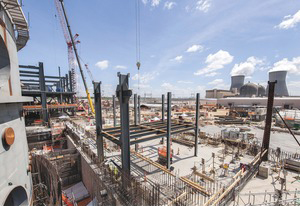根据佐治亚州Power,State Monitors等人的最近证明,随着持续的建筑延迟导致融资和相关成本,时间开始对植物Vo18luck.cubgtle核扩建项目的经济学施加“重大”压力。结果,在最近的6月听证会上进行了大量讨论,重点是完成核项目是否仍然具有经济意义。

In its latest report to the PSC, Georgia Power repeated the contractor's latest estimate for completion, which extends the previous schedule by 18 months to the revised in-service dates of June 2019 and June 2020, for Units 3 and 4, respectively. Additionally, Georgia Power executives stressed the contractor—a consortium of CB&I and Westinghouse Electric Co.—was at fault but remained publicly optimistic that future schedule slippage could be avoided.
佐治亚州电力主管艾莉森·奇克(Alison Chiock),戴维·克莱姆(David Clem)和戴维·麦金尼(David McKinney)在PSC共同证明中说:“承包商必须改善其绩效,以减轻当前的预测。”
国家监视代表PSC的史蒂文·罗伊特(Steven Roetger)和威廉·雅各布斯(William Jacobs)在共同证词中对这一概念进行了研究。
"We believe that little to no margin, or float, is embedded in the January 2015 [schedule]," they stated. "Consequently, [we] believe that there exists significant schedule delay risk." For instance, they noted, if Unit 4's schedule slips by more than six months—resulting in an in- service date past Jan. 1, 2021—Georgia Power could lose an estimated $522 million in production tax credits, possibly resulting in higher costs to ratepayers. Georgia Power owns about 46% of the project—which has an overall capital cost of $11 billion, plus financing—with other utilities sharing remaining costs.
In fact, Roetger and Jacobs added that a schedule updated in March adds three months to the new units' in-service dates.
截至4月,Roetger和Jacobs进一步估计该项目的施工完成百分比不到25%。
Philip Hayet, another PSC analyst, said these ongoing delays are adding "significant" stress to the project's underlying economic justification for Georgia Power. The bottom line, he says, is that the utility's share of the project's cost rose by 23%, to about $7.5 billion, including financing, since its last annual report. At the same time, the utility's estimated benefit for completing the units—versus stopping and building a natural gas plant instead—dropped 39%, from $5 billion to $3 billion.
Additionally, Glenn Carroll, with anti-nuclear group Nuclear Watch South, testified that "it would be cheaper to cancel construction given that Plant Vogtle 3 and 4 are not needed." Carroll cited Georgia Power data showing that the utility used just 58% of its system capacity in 2014.

